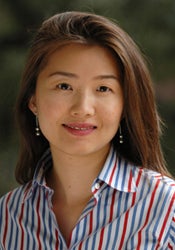The following op-ed, Coming of age with Clarence, written by HLS Assistant Professor Jeannie Suk, was published in The Wall Street Journal on October 12, 2007.
I came of age during the Clarence Thomas confirmation hearings. As a feminist freshman at Yale, I scrutinized the photos depicting Anita Hill’s sad and fatalistic resolve, and pondered how an accusation of sexual harassment could be “a high-tech lynching for uppity black folks,” as Mr. Thomas called it.
Like many others I thought the main issue was whether or not you believed her story. What followed from believing her was, well, orthodoxy: If her story was true, Mr. Thomas was obviously a bad man who had degraded his female subordinate with sexual attention and sexual talk, and was unfit to serve on the Supreme Court.
The tenor of the reaction to Justice Thomas’s recent memoir, “My Grandfather’s Son” has been: Why must he dredge up this sordid tale, 16 years later? He is a Supreme Court justice, after all, and we have all moved on, even Anita Hill.
But have we really moved on?
The debate kicked up by the memoir’s publication gives us an opportunity to consider those important issues of sex and power that were at stake, with 16 years of hindsight. A few years after the confirmation of Justice Thomas, we saw a series of sex-related accusations and revelations about another man in public life, then President Bill Clinton. In the public debate, there was much emphasis on the legal implications of whether he lied about his sexual conduct. But liberals at the time were often heard to say that, even assuming the allegations about him were true, his sexual conduct shouldn’t really affect our view of the job he was doing as president. That seemed right.
Comparing some liberals’ harsh judgment of Justice Thomas with this light judgment of Mr. Clinton tells a story of cultural inconsistency. But liberals will surely say that the disparity is perfectly consistent: Justice Thomas subordinated a woman against her will, while Mr. Clinton merely engaged in sexual conduct with willing women.
So let’s recall precisely what was alleged against each, bearing in mind that both denied most allegations. Justice Thomas was accused of repeatedly asking his employee on dates, which she declined, commenting on her attractiveness, and discussing sex in her presence. Mr. Clinton was accused of having state troopers escort Paula Jones, an employee of the state of which he was governor, to a hotel room where he touched her without consent and exposed his genitals. He also admitted to having sexual contact with a young intern working in his White House.
If the metric we are using is the abuse of power by male bosses against female employees, how is it that Justice Thomas has fared so badly while Mr. Clinton seems to have fared relatively well since he left office? According to that metric, is attempting to date and talking about sex to a fellow Yale-educated employee worse than touching, propositioning and exposing oneself to a nonconsenting, low-level state employee? As for the affair in the White House with Monica Lewinsky, the relationship may have been consensual. But one would expect that those subscribing to the prevailing workplace sexual-harassment orthodoxy would be troubled by the power disparity between the leader of the free world and an unpaid 22-year-old intern.
The point is that for too long we have allowed that dubious early 1990s judgment of Justice Thomas to remain a dominant feature of the discourse about him. Sure, he was confirmed, and President Clinton was impeached. In reality, partisan politics was likely more determinative than substantive views about sex and power.
Even today, it is extremely common to hear liberals talk about Justice Thomas as a sexual harasser who should not have been confirmed, and about President Clinton as a victim of our country’s fanatical sexual morality.
One need not be soft on sexual harassment to realize, after 16 years, that our country put Clarence Thomas through hell on the basis of accusations that don’t approach the sexual allegations that we have rightly allowed to recede into the background of Bill Clinton’s distinguished career. The high-tech lynching didn’t keep Justice Thomas off the Court, but it did plenty of damage that, on closer scrutiny today, doesn’t look fair by our own standards.
Ms. Suk is a law professor at Harvard University, and author of “At Home in the Law,” forthcoming from Yale University Press.
